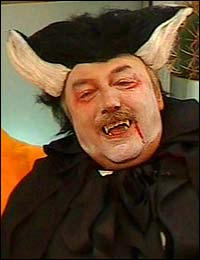Top tens and the making of The Making
 Top ten lists are fun, even if the discussions they invite are invariably inconclusive. The Adventures in Historical Materialism blog has a post on the ten best works of history produced by Marxist scholars: I'm inclined to respond with my own list, but I don't have time at the moment, so I'll just respond to Histomat's characterisation of EP Thompson's The Making of the English Working Class as an "absolute classic example of the tradition of 'History from Below'. After researching Thompson's life and work a bit, I'm somewhat uncomfortable with the label of 'history from below', whether it's applied to his own work or the work of other historians from his generation, like Christopher Hill and Eric Hobsbawm. Here's something I wrote on the origins of The Making which might explain my unease:
Top ten lists are fun, even if the discussions they invite are invariably inconclusive. The Adventures in Historical Materialism blog has a post on the ten best works of history produced by Marxist scholars: I'm inclined to respond with my own list, but I don't have time at the moment, so I'll just respond to Histomat's characterisation of EP Thompson's The Making of the English Working Class as an "absolute classic example of the tradition of 'History from Below'. After researching Thompson's life and work a bit, I'm somewhat uncomfortable with the label of 'history from below', whether it's applied to his own work or the work of other historians from his generation, like Christopher Hill and Eric Hobsbawm. Here's something I wrote on the origins of The Making which might explain my unease:After the war Edward Thompson spent an unhappy couple of years watching Attlee’s Labour government disappoint the hopes of its socialist followers. As a Communist Party member and aspiring writer, Thompson found himself under attack from ex-communist intellectuals turned Cold Warriors, and also from party bureaucrats who thought that the task of poetry was to increase tractor production in the Soviet Union. By 1948 Thompson had had enough. He packed up and hit the north, taking up a job teaching for the Workers Education Association in Yorkshire. The move north was as much a pilgrimage as a flight. Thompson hoped that a job teaching miners and railwaymen in an old stronghold of the Chartists and the Independent Labour Party would remove him from the influence of both Party orthodoxy and Cold War liberalism, and put him in direct contact with the authentic English socialism he equated with radical liberalism. The middle class Cambridge graduate was following in a tradition made famous by Orwell’s Road to Wigan Pier.
Thompson’s hopes were disappointed. He was a talented teacher and was well-liked by many of his students, but he discovered a Yorkshire very different from the one he had sought. The post-war boom, the replacement of rationing with the delights of American-style consumerism and an urban renewal programme had all helped change the culture of many workers. Although he did encounter some eager, class conscious workers, Thompson the teacher was often confronted by apathy and philistinism. In internal reports he complains of miner’s wives who want to discuss the personal lives of nineteenth century novelists, and miners who think that ‘poetry is a luxury the labour movement can do without’.
It is often thought that The Making of the English Working Class was stimulated by Thompson’s experience of a living working class socialist culture and tradition in Northern England. In his preface to the book Thompson encourages this view, claiming that ‘I have learned a great deal from members of my tutorial classes, with whom I have discussed many of the themes treated here’. In fact, Thompson’s masterpiece was the product of a contradiction between the expectations he had of his students and the reality he found in the classrooms of Yorkshire. The Making of the English Working Class was originally designed as a textbook which would penetrate the apathy and consumerism of most of Thompson’s students and uncover in them a mystical layer of ‘real experience’ left over from the Chartists and New Unionism. It is a quixotic as well as a heroic book.
(Reading this over, I think: doesn’t one adjective imply the other? Wasn’t Don Quixote a hero, for Cervantes?)















